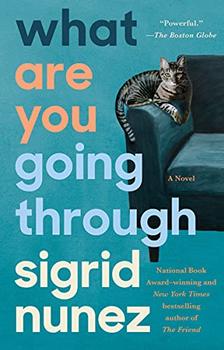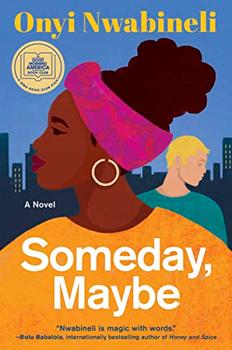Summary | Excerpt | Reading Guide | Reviews | Beyond the book | Read-Alikes | Genres & Themes | Author Bio

Shortly into What Are You Going Through by Sigrid Nunez, it becomes clear that the narrator is unreliable or, at the very least, absentminded; she has misled the reader by failing to mention a significant connection she has to another character. What additional details might she be withholding? This question becomes less consequential as the book winds on. The unnamed main character may conceal facts and approach the stories of others with marked bias, but what she shares soon begins to feel more important than what she doesn't, and the limits of her subjectivity begin to seem like the point.
If the novel is about any one thing, it is the narrator's experience of becoming involved in the end-of-life plans of a friend who has terminal cancer, but there are many detours along this main path. Like Nunez's National Book Award-winning novel The Friend, What Are You Going Through opts out of linear storytelling and follows the whims and quirks of its primary character's mind, sometimes striking out on tangents within tangents in a style that bears similarities to that of Rachel Cusk's Outline trilogy. The narrator seriously ponders her friend's condition, but she also takes the time to listen to a story told by a cat, describe the plot of a crime novel she finds in an Airbnb lodging and attend a dismal lecture about the state of the world. Events and reflections like these come together to reveal the character indirectly through her perceptions and interactions, transcending the borders of her perspective to give the reader a more complete picture of her.
The book's tendency to go down rabbit holes may be initially disconcerting for some, but its digressions are by turns conversational, humorous and philosophically engrossing. Just as secondary characters work to reveal the primary one, tangential preoccupations ranging from gender politics to aging and beauty to climate change eventually form the shape of what remains to be addressed: the probing question of how to exist in the midst of death — how to witness the death of a friend, the death of the planet — while still living life with any sense of purpose.
Through this question and the narrator's clearly limited point of view, Nunez's novel also focuses on communication and the realities people represent for one another. The title of the book is taken from the work of French philosopher Simone Weil (see Beyond the Book) — according to Weil, loving one's neighbor hinges on the ability to ask, "Quel est ton tourment?" or "What are you going through?" This question stands more or less as the antithesis of the obligatory American "How are you?" to which the expected response is a rote "Fine, how are you?" In keeping with Weil's encouragement towards meaningful connection, the unexpected bond the narrator forms with her friend during her illness bypasses customary social evasions and opens the way to a deeper examination of human relationships.
The book's most touching and striking element is its depiction of the intensity produced in situations where time is precious. Towards the end of the novel, the narrator mentions a book she is reading that compares watching someone die to falling in love. The two events seem to mesh in her mind as she considers her feelings about observing her friend's final days:
Jesus, you know, it wasn't supposed to happen like this. Even if it strikes me now as having been inevitable. But doesn't love always feel just so: destined, no matter how unexpected, no matter how improbable.
While there is nothing new in connecting love with death, Nunez's writing succeeds in capturing the strange, startling illumination both can bring. It also draws attention to how people sometimes diminish profound life experiences by corralling them into narrow ideas of beauty and romance. What Are You Going Through suggests that this diminishment may be overcome by a genuine curiosity about and interest in other human beings. As the narrator points out at one stage, Weil's question "What are you going through?" reads differently in the original French. She doesn't elaborate, but a literal translation of "Quel est ton tourment?" produces a question arguably even more generous and intimate, matching the generous and intimate tone of Nunez's novel: "What is your torment?"
![]() This review was originally published in The BookBrowse Review in November 2020, and has been updated for the
October 2021 edition.
Click here to go to this issue.
This review was originally published in The BookBrowse Review in November 2020, and has been updated for the
October 2021 edition.
Click here to go to this issue.

If you liked What Are You Going Through, try these:

by Aysegül Savas
Published 2025
Asya and Manu are looking at apartments, envisioning their future in a foreign city. What should their life here look like? What rituals will structure their days? Whom can they consider family?

by Onyi Nwabineli
Published 2024
Someday, Maybe is a stunning, witty debut novel about a young woman's emotional journey through unimaginable loss, pulled along by her tight-knit Nigerian family, a posse of friends, and the love and laughter she shared with her husband.
Flaming enthusiasm, backed up by horse sense and persistence, is the quality that most frequently makes for ...
Click Here to find out who said this, as well as discovering other famous literary quotes!
Your guide toexceptional books
BookBrowse seeks out and recommends the best in contemporary fiction and nonfiction—books that not only engage and entertain but also deepen our understanding of ourselves and the world around us.